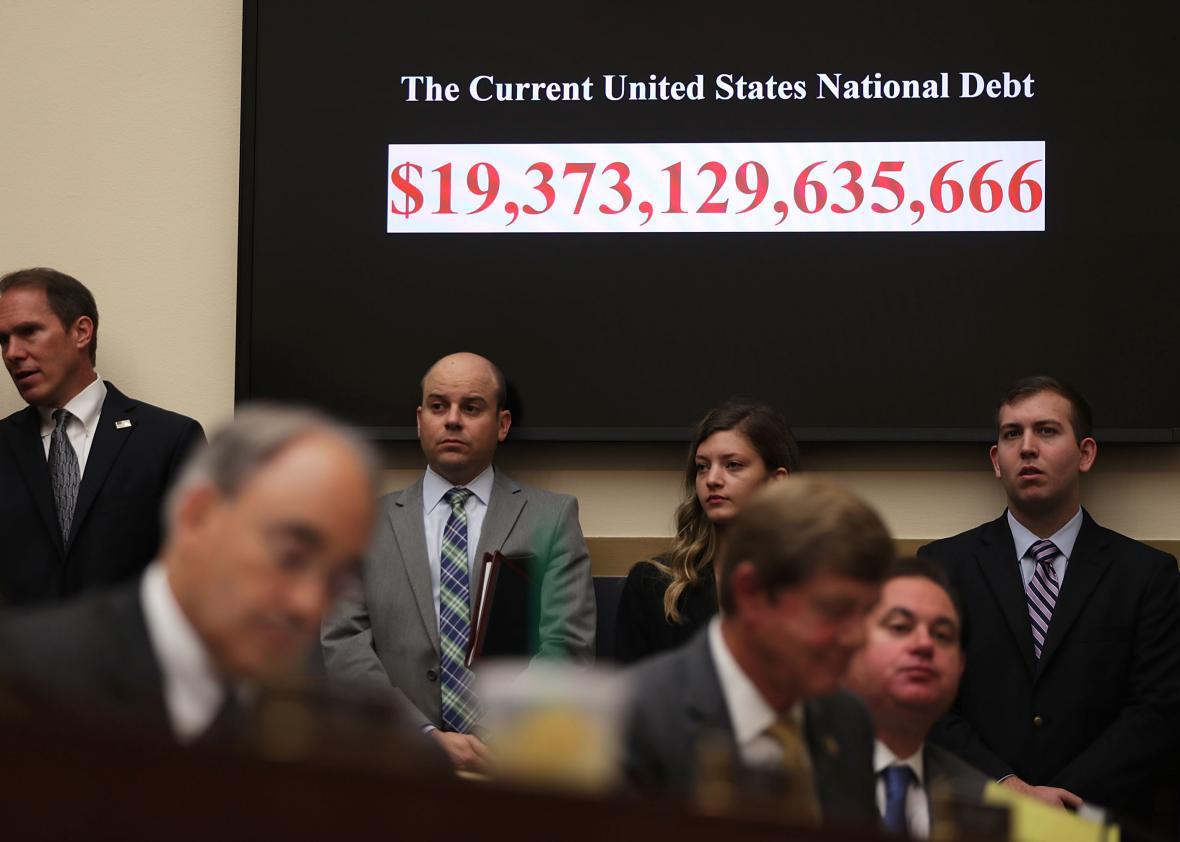I know. It’s hard right now to take your eyes off Donald Trump’s exploding oil tanker of a presidential campaign. Now may not seem like the time to argue about fiscal policy, as we might in a normal election cycle.
But at some point Americans will have to go back to arguing about things like taxing and spending. And when it comes to that topic, this week marked a small but fascinating milestone in the world of Washington policy thinking, as one well-known conservative think tank essentially abandoned one of the oldest arguments for why governments shouldn’t run budget deficits.
For a long, long time, economists have argued that government borrowing hurts economic growth by “crowding out” private investment. Instead of lending to businesses, the thinking goes, savers end up lending to Washington to finance its deficits, which means companies have less to spend on things like new factory equipment or software that will set up the economy for long-term growth.
Crowding out isn’t the only argument against deficit spending. But it’s certainly a major one that’s considered entirely orthodox. When the Congressional Budget Office makes its long-term economic projections, for instance, it incorporates the effects of government crowd-out into its math. As a result, the concept has historically been a potent talking point for conservative policy advocates and politicians—balance the budget and we’ll free up money for investment, leading to more prosperity down the line.
But there have always been reasons to question the extent to which crowd-out is a real problem. And in our weird world of post-recession economics, there’s good reason to doubt whether it’s an issue at all. That’s because the whole concept of crowding out is based on the idea that there’s only so much money out there for governments and businesses to borrow. But for more than a decade now, the world has seemingly had the opposite problem. There are too many savings floating around and not enough investment opportunities to suck them up, which has led to persistently low interest rates and swollen asset prices. Nobody is exactly sure why this has happened, though there are plenty of theories. All the way back in 2005, Ben Bernanke theorized that emerging economies like China had created a “savings glut” by building up their currency reserves to fight off financial crises. More recently, Larry Summers has popularized the idea that the world is facing a period of “secular stagnation.” But either way, in a world where governments and corporations can get paid to borrow, nobody’s really worried about the limited supply of savings, so concerns about crowding out seem a bit anachronistic.
This week, the conservative Tax Foundation—the Republican authority of choice on all things related to the tax code—publicly agreed that crowding out is so passé. It said so in a long, wonky post about the in-house economic model it uses to assess the impact of tax cuts on the economy. Basically, the foundation’s analysts don’t think budget deficits created by giant tax cuts like the ones Donald Trump has proposed will hurt growth over the long term, because corporations and the Treasury will always find more money they can borrow:
Economists all agree that both budget deficits and private borrowing require saving. But the question is how scarce that saving is. At Tax Foundation, we believe saving is not nearly as scarce as the Penn Wharton model shows.
We believe this for a number of reasons: for one, many mainstream economists are discussing ideas like Secular Stagnation and the Global Savings Glut. These ideas suggest there’s oodles of cash on the right side of the equation, looking around for investments to finance and coming up short. As a result, interest rates are coming down in developed countries around the world as the savers bid up the prices of financial instruments.
Under these kinds of circumstances, worries about unavailable saving seem misplaced.
From a political perspective, there are a few funny things about this line or reasoning. First, it’s just as good a justification for massive government spending as it is for budget-busting tax cuts. But aside from that, it also weakens the argument for tax cuts on investment income, which, of course, conservatives desperately want. One of the big points in favor of lowering the tax rate on capital gains is that it will lead people to put more money into stocks and bonds, leaving the companies with a bigger pool of money that they can invest. But if there’s already an effectively infinite global pool of cash that companies can borrow from, leading people to save even more might be counterproductive, since it will just exacerbate the glut. When I brought that up on Twitter, the Tax Foundation folks countered that cutting capital gains rates will make companies invest more, because they won’t need as high a rate of return on new projects to make their investors happy. But that’s not exactly the standard argument you hear for slashing the capital gains rate. (I’m also skeptical about it, given that business investment in recent decades has proved to be pretty insensitive to the cost of capital, which also influences profits—but now we’re getting a little deep.)
In any event, we’ve reached an interesting left-right convergence on the idea that budget deficits, in some very important ways, don’t really matter anymore, or at least don’t matter the way they used to. Of course, centrist wonks are going to keep incorporating crowding out into their economic projections. But if anything, that shows why you have to take those sorts of estimates with a grain of salt; we’re at a point where there are profound disagreements about the basic ways issues like taxes affect the economy. When we’re all done rubbernecking at Trump, there’ll be lots to argue about.
